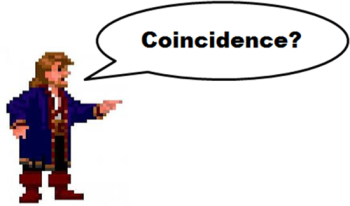A Chastisement of the Entitled Adventure Gamer in Us All
There’s this recurring sentiment from adventure gamers toward Telltale that I’ve witnessed over the past several years. It’s actually a fairly boring, predictable phenomenon, that one where a vocal minority self-styled as “the true fans” turns against a studio that it feels has abandoned its noble roots to worship at the altar of that sultry golden mistress, profit. Yawn.
For our purposes, the observation is more interesting in the case of Telltale, as the outcry began when it became clear that the developer-publisher, once associated – around these parts, anyway - with the revival of the cult Sam & Max and Monkey Island video game series, was turning its focus, at least for the foreseeable future, away from those specific IPs (assuming they even had a say in the case of Monkey Island) in favor of others.

To be clear, I’ve got no quarrel with such disappointment, in and of itself. I’m hardly here to give the gears to anyone who would prefer that Telltale be serving the more nostalgic licenses over something they’re less interested in. At the same time, let’s not pretend that Fables is American Idol, ya know? Heck, that comic strip is arguably more underground than Bone, the very first license Telltale ever secured, which is one chink in this flimsy idea that Telltale has changed in any appreciable way.
Telltale is still primarily dealing with cool properties that lend themselves as much to great story games as they do to reliable revenue. In fact, their already forgotten dalliances with CSI and Law & Order aside, you’d be hard pressed to find a license they’ve chosen to date that isn’t objectively pretty freaking cool and worthy of the interactive treatment, even if on an individual basis they don’t carry necessarily carry consistent appeal or familiarity with You, the guy who only followed Telltale because you saw them as a way to get sequels to your old favorites.
Which I think gets to the heart of it. When certain people accuse Telltale of betraying their past, of abandoning their roots, it’s clear enough that “roots” is code for “stuff that panders to my niche.”
And it’s true, Telltale was seemingly pandering to our niche for some time, but you don’t have to take too many steps back to see that was largely incidental. Their objective from day one was to make episodic story games using recognizable IPs. That sounds somewhere around exactly what they’re doing now. If anything, Telltale’s more faithful to their inaugural mission statement today than they were when they were starting out and simply didn’t have the stroke to score something of the magnitude of Game of Thrones or The Walking Dead.
Any game that places narrative and characters first, as Telltale’s work expressly does, unavoidably shares priorities with graphic adventure games. It only made sense that Telltale would use that genre as a template when they were starting out and evolve from there. And frankly, the evolution hasn’t been that drastic, even if they’ve undeniably kept getting better, more ambitious and more refined at what they do.
Regardless of what your memory might say, if you were to boot up Out from Boneville, you’d see a rudimentary version of something that is nonetheless unmistakably a Telltale game. It’s all right there, from its heavily streamlined take on classic inventory puzzles to its emphasis on performances and the cinematic liberty offered to the in-game camera. For their first outing, it’s remarkably accurate to the intent of their current products, ten years later.

And Telltale has always been transparent about their intent. Don’t believe me? Have a gander at the Adventure Gamers article about them in 2004, mere months after the inciting incident, when the company was nothing more than three founders, one employee, and an oddly kinky Timmy the Monkey blow-up doll.
While they weren’t slavish to their original idea of how self-contained their “episodes” would be, the vision they started the company with as outlined in that article should seem very familiar even now. Notice, also, that nowhere do they purport to be the custodians of neglected LEC brands, even if in two wonderful cases (or one and half, since Sam & Max is not technically LucasArts-owned) things broke in a way that made us particularly happy.
Neither did they string anybody along by claiming they were, in a traditional sense, an adventure game developer. As early as 2006, before the first Sam & Max episode dropped, Dave Grossman represented the company with this clarification:
You may be a little off the mark in having us aimed at adventure games. We're not really trying to do that, exactly, we just have a lot of experience making adventure games, and are bringing the things that we learned about storytelling in games from that to bear on the kinds of things we're doing.
Personally, I’d say Telltale does and always has made adventure games, but that’s its own debate and beside the point, which is this: the company was very clearly trying to dissuade people from interpreting them as LucasArts 2.0, and almost immediately. It’s the fans who built that mirage, and it’s a perception that prevailed stubbornly.
It’s not arguing in good faith if you’re judging a company’s direction against a perception you invented. Your perspective on modern-day Telltale may be love, hate, or somewhere in between, and that’s all sensational, but let’s not be disingenuous and decry that they’ve “lost their way” based on the licenses they’re executing when they’re only doing exactly as they’ve always advertised.

Put another way: Count your effing blessings. Two years after Telltale was founded, they delivered on a seemingly unfulfillable dream of more Sam & Max adventure games, the first in thirteen (13) years. A Sam & Max drought many of us were convinced would end when the world did was abruptly relieved with three excellent games, each better than the last.
We furthermore have Telltale to thank for the reprint of the characters’ entire collected works and the general renewed awareness of the franchise that very likely contributed to the DVD release of the TV show, the newest strip by Purcell, and the re-release of Sam & Max Hit the Road only weeks ago. On top of all that they surprised us with an arguably even less probable new installment of Monkey Island in 2009.
Heck, even if the The Walking Dead is fated to surpass it, Sam & Max stands as the only Telltale series thus far to receive three seasons. A good way for Sam & Max fans to hear laughter from a higher power is to frame themselves as disenfranchised. (Or to, say, presume to speak for Steve Purcell.) The characters continue to be flaunted proudly in cameo capacity, and the company has promised that we haven’t seen the last of them. They’re all but official mascots.
Beyond that, there’s a very strong case to be made that the stuff Telltale has been doing over the last decade has played a crucial role in an overall adventure game resurgence, further empowered by Kickstarter, that we’ve witnessed in the past several years. As an influence they’ve demonstrably been a dramatic net positive to the both the genre at large as well as to some specific licenses we at Mojo loved that, before Telltale came along, didn’t have much of a future.
So, some perspective, please. We once survived over a decade of no Sam & Max games before Telltale quadrupled the number of them in existence. If Telltale never does anything more with the LEC licenses – which we already know isn’t true on the Sam & Max front - we got more than we dared imagined possible. And as Sony’s collaboration with Double Fine to bring us Grim Fandango’s new coat of paint demonstrates, there are other forces at play on the side of doing something with the old LucasArts titles.
My radical position: As we follow the continued and upcoming releases of Game of Thrones, Borderlands, Fables, The Walking Dead - many or all of which rightly excite some of us - let’s not reflect on Telltale’s back catalog with bitterness that our pet favorites among their growing list of licenses might be past their time in the spotlight, but with gratitude that as part of its journey to become a successful mainstream publisher, Telltale found value in giving those universes so beloved to us here a shot in the arm.
No other company did.
